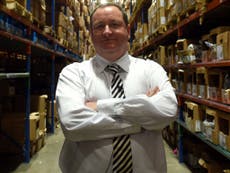Sir Philip Green’s account of the BHS pension crisis is not credible. MPs are rightly making an example of him
Only by a brutally rigorous enforcement of the law will capitalism win the popular support it so desperately needs – and which it is currently losing

Sir Philip Green’s performance in front of a joint hearing of the Business and Work and Pensions select committees yesterday delivered precisely what his reputation suggested it would. Brash, aggressive, charmless and frequently menacing, he evinced little to none of the pleasantries such occasions usually engender.
Fine, if pleasantries aren’t your thing; goodness knows pleasantries aren’t what made him a billionaire. But in his repeated failure to answer the central questions, and indeed allegations, against him, Sir Philip confirmed what has already become a consensus not just in the media coverage he so despises, but in the City, whose favour and approval he so craves.
Following the Rupert Murdoch approach to these hearings, Sir Philip got his mea culpa in early. At the very outset he said that he would like to apologise for the demise of BHS. Later, he said that he was extremely keen to help sort out the mess that is the BHS pension scheme, which was in surplus when he bought it but now faces a £571m deficit, causing anguish for its 20,000 members.
But even the most favourably disposed observer would have to conclude from his tone and disposition that this apology and offer of help were somewhere on the spectrum between woefully insincere and way too little, way too late. In the rest of his evidence, Sir Philip couldn’t hide what seemed a flagrant disregard for the suffering his mismanagement has caused.
There were two main pillars to his defence. The first was that, in a company so big, and in a sector (retail) so challenged, it was unrealistic for an owner such as he to be on top of all the detail of what was happening in the business.
The second, familiar to juries and judges the whole world over, was that many of the events he was being interrogated about happened many years ago and he couldn’t possibly remember. Neither defence was satisfactory.
Though Sir Philip Green repeatedly said he was “not running away”, and that it wasn’t his style to blame other people, the very clear implication was that it is indeed the fault of his advisers that the pension scheme was catastrophically mishandled.
In several exchanges, his shameless elision of the failings of the scheme with discussion of his advisers’ shortcomings made clear, in a very unsubtle way, that he was in fact blaming those around him. That looked cheap, immature, cowardly and unconvincing.
As for his lack of memory on key details, this too verged between the implausible and the suspect. Asked specific questions about what he did and didn’t say about the pension scheme to Dominic Chappell, the former bankrupt to whom he sold BHS, and also Steve Webb, the pensions minister, Sir Philip prevaricated.
It simply isn’t credible to give no account, when asked by MPs, about what he did or didn’t say to a prospective buyer of such a vast business – and also a government minister – about a pension scheme that he will have known had gone from surplus to £571m deficit under his watch.
He kept saying “without wishing to be rude”, only to then promptly be extremely rude. His manners and wealth seem to grow in inverse proportion. The various MPs who had to deal with him are sufficiently grown up to handle his viperish tendencies, but the impact of his actions will be felt far beyond Westminster – and even beyond the families of the 11,000 people put out of work while he took out hundreds of millions in dividends for his Monaco-based wife (who legally avoided tax on that income).
The case of Sir Philip Green and the collapse of BHS is a verdict on the status of capitalism itself. The Independent is staunchly capitalist – so long as everything possible is done to ensure capital reaches the poor.
Nearly eight years after the financial crash, huge swathes of the poor in advanced countries are seeing their real incomes fall because of globalisation and technology. Inequality is rising; our social fabric is fraying. The likes of Sir Philip Green, meanwhile, are pulling away, legally avoiding paying their fair share because of the international mobility of modern capital.
Only by a brutally rigorous enforcement of the law, and an all-out assault on the growth of money and tax evasion, combined with smart policy that ensures the poor are given proper access to capital, will capitalism win the popular support it so desperately needs, and which it is currently losing. Only by relentless and ruthless public scrutiny of the fat cats who destroy businesses while financially engorging themselves will capitalism fulfil its moral potential.
If that means Sir Philip Green needs to be made an example of, so be it.


Join our commenting forum
Join thought-provoking conversations, follow other Independent readers and see their replies